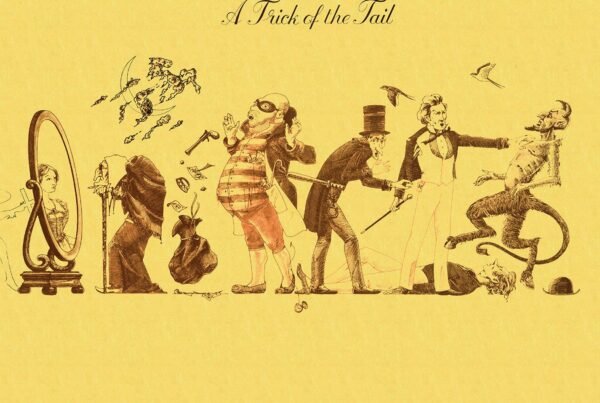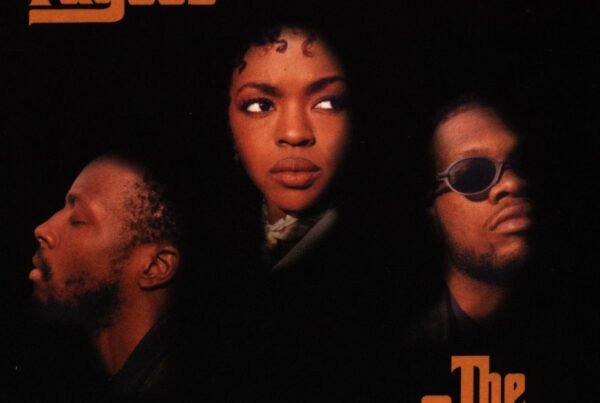Release date: April 1, 2014 | Relapse Records | Facebook | Twitter | Instagram | Bandcamp
Hey everyone. David filling in for Dominik today. We got a cool-ass episode for y’all, covering a modern marvel of progressive death metal. Over the years, Pyrrhon have earned the right to be considered among the greats of the genre with album after album of forward-thinking, acerbic, and challenging music. That run arguably started with the Brooklyn, NY band’s sophomore album, The Mother of Virtues. Seeing as it’s just about to turn ten years old and they have just finished work on their fifth album, now seems like the best time to reflect on such a piece and we got none other than fellow editor/writer Jake to do that for us…
Jake Walters
Sometimes when we don’t know how to explain something in relatable terms, our languages supply us with words for that, ironically. Pyrrhon is one such band that is in most cases labeled ‘experimental’ death metal because frankly that is easier than trying to identify each element in their genre casserole. That’s right you heard it here first, Pyrrhon are ‘casserole’ death metal. About a decade ago this band found their footing and what would become the blueprint for their approach from everything that came after it with 2014’s The Mother of Virtues. This is chaotic, dissonant, twisting death metal that levies a full on assault to the ears as well as the brain and as with most music of this ilk, the details could easily be missed if the listener is kept at arm’s length due to the cacophonic aura of this music. Today’s ASIR is all about embracing the formless and unpacking the beauty that is contained within.
From the outset, the art itself depicts an overwhelming sense of activity and the unnerving amount of eyes and flies approaching and decorating this pregnant figure is an interesting proposition. On one hand, it seems that the figure’s posture welcomes this impending infestation; whether that is through willing sacrifice or logical acquiescence, who can say? On the other hand, is this figure’s presence holding back the flood of insects? Regardless of the meaning, the cover image of this mother depicts the atmosphere of this album to a tee.
If you’ve heard Pyrrhon before, you already know that. So what of the music? Let’s get into that. Pyrrhon play a highly technical, pseudo-avant-jazz, progressive death metal (see why ‘experimental’ is easier?) and all of these ideas are present at every level. Whether it’s Doug Moore’s sinister vocals, Dylan DiLella’s guitar work, the unpredictable thumping of Erik Malave’s bass, or the ever-impressive drumming of Alex Cohen. Nothing on this album is stock, default, or basic. Tones, ideas, compositions – literally every moment – is bespoke.
Opening with the brief “The Oracle of Nassau”, the album is never deceptive about what is to come but rather those initial moments show a somewhat restrained impression of what is to follow. The tracklist is paced brilliantly with song lengths and structures that oscillate in length allowing just a moment or two to catch your breath – certainly not enough time to process what just happened – before being thrown into an entirely new situation. Of course, that is the fun and beauty of an album like this: the unpredictability.
When it comes to death metal, it’s pretty easy to leap to certain preconceptions about the lyricism. For most of the genre, lyrics are often of secondary importance and are fantastical violent romps. Given that the band is named for a Greek philosopher – and with an album title like The Mother of Virtues – it was unlikely that Pyrrhon would take that route and boy howdy they did not. One of the best part of this album is the way that the lyrics are handled with a sense of relatable points of view and voice while embracing a larger perspective about philosophical topics and far more existential themes than you’re likely to encounter on the run-of-the-mill metal album. But like I already said, every part of this album is bespoke. “White Flag” delves into just how fickle virtues can e when confronted with loss with lines such as ‘It’s amazing what you can give up/If you just want to survive/You’ll discard cherished convictions/And spread yourself wide for your ravagers/When they approach to defile you’.
While the above lyrics have a certain level of prose to them, the album never falters in favor of pretense but balances the tone with a certain relatability. “Implant Fever” begins with ‘Sometimes I stare for too long into the sun/Until my vision grows grainy with pixels/I can feel the dials in my forebrain turn/Someone’s in there, tampering with the controls’ which bridges a familiar feeling and relatable experience into something far more sinister. The delivery of these lyrics by Moore are also one of the reasons that they work so well on top of everything else, is that they are delivered with apt consternation. “The Parasite In Winter” – the penultimate track – is one of the sharpest visions that the band conjures on The Mother of Virtues both lyrically and musically and it flows into the final (and title) track which closes the album as its crown jewel. “The Mother of Virtues” is a ten-minute allegorical interpretation of the drive to create and reproduce, and one of the most engrossing passages of the album as a whole.
After a trip through this album things become a little clearer. For instance, the mother on the cover is most certainly holding back the horrors with her own set of moral codes. Or is she? Is anything clearer? Actually, no. And frankly I do feel that this is part of the journey that this record encourages: eschewing preconceptions. About everything. This is a metal record but at the time of release it was blowing down the facades of what the genre could sound like and that deeper topics can be seamlessly woven into extreme music. While dealing with heavier topics is by no means novel by this time, blending existential musings with wildly experimental death metal is still incredibly rare and rarer still are albums and bands that can do so with panache.
Pyrrhon have been consistently doling out avant-beatings for well over a decade now and have yet to have a single misstep, but one could easily point to The Mother of Virtues as where the band crystalized (to whatever extent a band like this can be set in stone) and forged their identity. This is an album that finds congruence at every layer and while this is hardly an approachable record at first – both sonically and thematically – it is a work of art that needs and deserves to be pondered over and over again.






